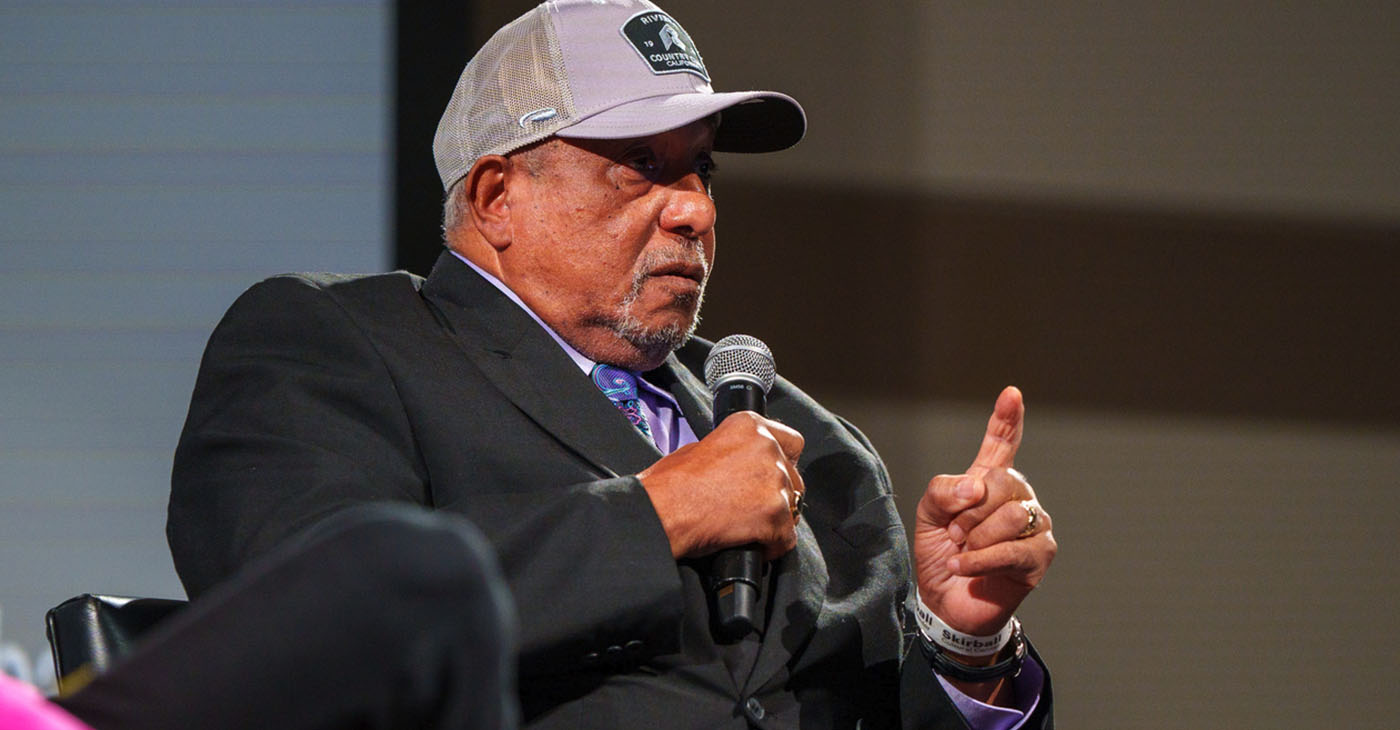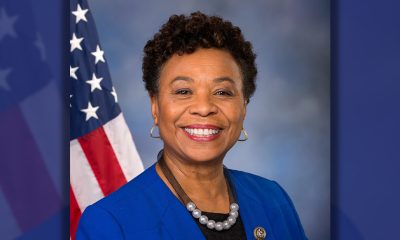Activism
Montgomery Bus Boycott at 68; Event Revisits Black-Jewish Collaboration
Scholar, minister and activist Rev. Dr. Bernard LaFayette Jr. was the guest speaker at L.A.’s Skirball Cultural Center’s “Perspectives on Black-Jewish Relations in The Fight for Civil Rights” discussion held Dec. 6, on the 68th anniversary of the Montgomery Bus Boycott. He talked about historic collaboration between African Americans and Jews and he participated in a conversation that focused on the ongoing struggle for civil liberties and the civil rights era of the 1960s.

By Solomon O. Smith
California Black Media
Scholar, minister and activist Rev. Dr. Bernard LaFayette Jr. was the guest speaker at L.A.’s Skirball Cultural Center’s “Perspectives on Black-Jewish Relations in The Fight for Civil Rights” discussion held Dec. 6, on the 68th anniversary of the Montgomery Bus Boycott.
He talked about historic collaboration between African Americans and Jews and he participated in a conversation that focused on the ongoing struggle for civil liberties and the civil rights era of the 1960s.
The evening began with the viewing of “This Light of Ours: Activist Photographers of the Civil Rights Movement,” an exhibition that showcased the work of nine photojournalists who were embedded in the civil rights movement, providing an intimate look at the organizations that created leaders like Lafayette.
Los Angeles’ District 5 city councilmember Katie Yaroslavsky hosted the evening’s conversation with LaFayette.
Lafayette described seeing Jewish men and women side by side with Black protesters, enduring the same violence.
“We found a strong bond that existed, and that developed,” said LaFayette, describing the relationship between Black and Jewish leaders, intellectuals, and activists during the civil rights movement.
“If it wasn’t for the Jewish people, we’d have a different attitude towards White folks. Because we could relate to the Jewish people, therefore all White people weren’t the same,” he added.
The conversation between LaFayette and Yaroslavsky presented an alternate picture to the widespread portrayal of the history between African Americans and Jewish Americans as one that is ridden by conflict with tensions with Black Muslims and other religious groups, antisemitic scholarship, accusations of exploitation in the entertainment industry, and numerous other examples.
Lafayette was a founding member of the Student Nonviolent Coordinating Committee (SNCC), a member of the Southern Christian Leadership Conference (SCLC), a Freedom Rider and a scholar on nonviolent resistance.
Lafayette spoke about his upbringing, explaining how the guidance of strong Black female figures led him to a life dedicated to Christianity and activism, starting with his grandmother.
Lafayette credited her with his ordination as a minister. He said he originally wanted to become a journalist, but his grandmother had other plans.
“My grandmother insisted that I was not going to be anything but a preacher,” Lafayette said. “She said ‘you have the mark of a preacher.’” The college she found for him was the American Baptist Theological Seminary in Nashville, Tennessee where he met his roommate, John Robert Lewis, the Georgia congressman and civil rights legend who passed away in 2020.
Lewis, who was already active in the movement, was instrumental in LaFayette meeting one of his heroes and philosophical mentors, James Morris Lawson Jr.
Yaroslavsky asked Lafayette about the connection between Jews and the Black community, mentioning activists like Rabbi Joachim Prinz, theologian Rabbi Abraham Joshua Heschel and the many Jewish men and women who participated as Freedom Riders.
After the discussion, a reception was held for Lafayette’s book, “In Peace and Freedom, My Journey in Selma,” which provides an insider perspective on the Civil Rights Movement of the 1960s and Lafayette’s time in Selma, Alabama with Martin Luther King Jr. Lafayette was with King only hours before he was assassinated.
Lafayette left the audience with what he calls a key to being a nonviolent activist and the way he lives his life.
“The main thing is not how much you can gain for yourself, but how much can you give to others, because you’re not going to be here that long,” he said.
This resource is supported by funding provided by the State of California, administered by the California State Library in partnership with the California Department of Social Services and
the California Commission on Asian and Pacific Islander American Affairs as part of the Stop the Hate program.
Activism
Oakland Post: Week of April 24 – 30, 2024
The printed Weekly Edition of the Oakland Post: Week of April 24 – 30, 2024

To enlarge your view of this issue, use the slider, magnifying glass icon or full page icon in the lower right corner of the browser window. ![]()
Activism
Oakland Post: Week of April 17 – 23, 2024
The printed Weekly Edition of the Oakland Post: Week of April 17 – 23, 2024

To enlarge your view of this issue, use the slider, magnifying glass icon or full page icon in the lower right corner of the browser window. ![]()
Activism
Oakland Schools Honor Fred Korematsu Day of Civil Liberties
Every Jan. 30, OUSD commemorates the legacy of Fred Korematsu, an Oakland native, a Castlemont High School graduate, and a national symbol of resistance, resilience, and justice. His defiant stand against racial injustice and his unwavering commitment to civil rights continue to inspire the local community and the nation. Tuesday was “Fred Korematsu Day of Civil Liberties and the Constitution” in the state of California and a growing number of states across the country.

By Post Staff
Every Jan. 30, OUSD commemorates the legacy of Fred Korematsu, an Oakland native, a Castlemont High School graduate, and a national symbol of resistance, resilience, and justice.
His defiant stand against racial injustice and his unwavering commitment to civil rights continue to inspire the local community and the nation. Tuesday was “Fred Korematsu Day of Civil Liberties and the Constitution” in the state of California and a growing number of states across the country.
One OUSD school is named in his honor: Fred T. Korematsu Discovery Academy (KDA) elementary in East Oakland.
Several years ago, founding KDA Principal Charles Wilson, in a video interview with anti-hate organization “Not In Our Town,” said, “We chose the name Fred Korematsu because we really felt like the attributes that he showed in his work are things that the children need to learn … that common people can stand up and make differences in a large number of people’s lives.”
Fred Korematsu was born in Oakland on Jan. 30, 1919. His parents ran a floral nursery business, and his upbringing in Oakland shaped his worldview. His belief in the importance of standing up for your rights and the rights of others, regardless of race or background, was the foundation for his activism against racial prejudice and for the rights of Japanese Americans during World War II.
At the start of the war, Korematsu was turned away from enlisting in the National Guard and the Coast Guard because of his race. He trained as a welder, working at the docks in Oakland, but was fired after the bombing of Pearl Harbor in 1941. Fear and prejudice led to federal Executive Order 9066, which forced more than 120,000 Japanese Americans out of their homes and neighborhoods and into remote internment camps.
The 23-year-old Korematsu resisted the order. He underwent cosmetic surgery and assumed a false identity, choosing freedom over unjust imprisonment. His later arrest and conviction sparked a legal battle that would challenge the foundation of civil liberties in America.
Korematsu’s fight culminated in the Supreme Court’s initial ruling against him in 1944. He spent years in a Utah internment camp with his family, followed by time living in Salt Lake City where he was dogged by racism.
In 1976, President Gerald Ford overturned Executive Order 9066. Seven years later, the 9th Circuit Court of Appeals in San Francisco vacated Korematsu’s conviction. He said in court, “I would like to see the government admit that they were wrong and do something about it so this will never happen again to any American citizen of any race, creed, or color.”
Korematsu’s dedication and determination established him as a national icon of civil rights and social justice. He advocated for justice with Rosa Parks. In 1998, President Bill Clinton gave him the Presidential Medal of Freedom saying, “In the long history of our country’s constant search for justice, some names of ordinary citizens stand for millions of souls … To that distinguished list, today we add the name of Fred Korematsu.”
After Sept. 11, 2001, Korematsu spoke out against hatred and discrimination, saying what happened to Japanese Americans should not happen to people of Middle Eastern descent.
Korematsu’s roots in Oakland and his education in OUSD are a source of great pride for the city, according to the school district. His most famous quote, which is on the Korematsu elementary school mural, is as relevant now as ever, “If you have the feeling that something is wrong, don’t be afraid to speak up.”
-

 Activism4 weeks ago
Activism4 weeks agoOakland Post: Week of March 27 – April 2, 2024
-

 #NNPA BlackPress4 weeks ago
#NNPA BlackPress4 weeks agoBeloved Actor and Activist Louis Cameron Gossett Jr. Dies at 87
-

 Community1 week ago
Community1 week agoFinancial Assistance Bill for Descendants of Enslaved Persons to Help Them Purchase, Own, or Maintain a Home
-

 Activism3 weeks ago
Activism3 weeks agoOakland Post: Week of April 3 – 6, 2024
-

 Business2 weeks ago
Business2 weeks agoV.P. Kamala Harris: Americans With Criminal Records Will Soon Be Eligible for SBA Loans
-

 Activism2 weeks ago
Activism2 weeks agoOakland Post: Week of April 10 – 16, 2024
-

 Community2 weeks ago
Community2 weeks agoAG Bonta Says Oakland School Leaders Should Comply with State Laws to Avoid ‘Disparate Harm’ When Closing or Merging Schools
-

 Community7 days ago
Community7 days agoOakland WNBA Player to be Inducted Into Hall of Fame























































